- Home
- Darren Shan
Lord of the Shadows Page 7
Lord of the Shadows Read online
Page 7
I kept to the sides of streets and alleys, so I could grab a fence for support or lean against a wall to rest. I didn’t pass many people. Those I did pass ignored me. That surprised me, even in my dazed state, until I realized how I must look. A teenager, reeling along the path, head bowed, body crooked over, moaning softly — they thought I was drunk!
Eventually I had to stop. I was at the end of my rope. If I didn’t sit down and rest, I’d drop in the middle of the street. Luckily I was close to a dark alley. I fell into it and crawled away from the streetlights, deep into welcome shadows. I stopped beside a large black garbage can, sat up against the wall by which it was set, and dragged my legs in.
“Just . . . a short . . . rest,” I wheezed, laying my head on my knees, wincing at the pain in my shoulder. “A few . . . minutes . . . and then I can . . .”
I got no further. My eyelids fluttered shut and I passed out, at the mercy of any who happened to chance upon me.
My eyes opened. It was later, darker, colder. I felt like I was encased in a block of ice. I tried lifting my head, but even that small effort proved too much for me. I blacked out again.
The next time I awoke, I was choking. Some stinging liquid was being forced down my throat. For a confused moment I thought I was a raw half-vampire again, and that Mr. Crepsley was trying to force me to drink human blood. “No!” I mumbled, slapping at the hands holding my head. “Not gonna . . . be like you!”
“Hold him still!” someone grunted.
“It’s not that easy,” the person holding me complained. “He’s stronger than he looks.” Then I felt a body pressing down on mine, and a voice whispered in my ear, “Steady, kid. We’re only trying to help.”
My head cleared slightly and I stopped struggling. Blinking, I tried to focus on the faces of the men around me, but it was either too dark or my sight was clouded with pain. “What . . . are you?” I gasped, meaning were they friends or foes.
The man holding me must have misheard my question, and thought I’d asked who were they. “I’m Declan,” he said. “This is Little Kenny.”
“Open wide,” Little Kenny said, pressing the rim of a bottle to my lips. “This is cheap and nasty, but it’ll warm you up.”
I drank reluctantly, unable to argue. My stomach filled with a sickening fire. When Little Kenny took the bottle away, I leaned my head back against the wall and groaned. “What time . . . is it?” I asked.
“We don’t bother with watches,” Declan chuckled. “But it’s late, maybe one or two in the morning.” He took hold of my chin, turned my head left and right, then picked at the strip of shirt that was stuck to my shoulder with dried blood.
“Ow!” I yelped.
Declan released me immediately. “Sorry,” he said. “Does it hurt much?”
“Not . . . as much . . . as it did,” I muttered. Then my head began to swim and I half-blacked-out again. When I recovered, the two men were huddled together a few feet away, discussing what to do with me.
“Leave him,” I heard Little Kenny hiss. “He can’t be more than sixteen or seventeen. He’s no good to us.”
“Every person matters,” Declan disagreed. “We can’t afford to be picky.”
“But he’s not one of us,” Little Kenny said. “He probably has a family and home. We can’t start recruiting normal people, not until we’re told.”
“I know,” Declan said. “But there’s something different about him. Did you see his scars? And he didn’t get that wound fighting on the playground. We should take him back with us. If the ladies choose not to keep him, we can get rid of him easily enough.”
“But he’ll know where we are!” Little Kenny objected.
“The shape he’s in, I doubt he even knows what town this is!” Declan snorted. “He’s got more things to worry about than marking the route we take.”
Little Kenny grumbled something I couldn’t hear, then said, “OK, but don’t forget it was your choice, not mine. I’m not taking the blame for this.”
“Fine,” Declan said, and returned to my side. He rolled my eyelids all the way up and I got my first clear look at him. He was a large, bearded man, dressed in shabby clothes, covered in grime — a tramp. “Kid,” he said, snapping his fingers in front of my eyes. “You awake? Do you know what’s going on?”
“Yes.” I glanced over at Little Kenny and saw that he was also a tramp.
“We’re taking you back with us,” Declan said. “Can you walk?”
I assumed that they meant to take me to a mission house or homeless shelter. That wasn’t as preferable as the Cirque Du Freak, but it was better than a police station. I wet my lips and locked gazes with Declan. “No . . . police,” I moaned.
Declan laughed. “See?” he said to Little Kenny. “I told you he was our kind of people!” He took hold of my left arm and told Little Kenny to take my right. “This will hurt,” he warned me. “You ready for it?”
“Yes,” I said.
They pulled me to my feet. The pain in my shoulder flared back into life, my brain ignited with fireworks, and my stomach lurched. Doubling over, I threw up on the alley floor. Declan and Little Kenny held me while I vomited, then hauled me up.
“Better?” Declan asked.
“No!” I gasped.
He laughed again, then shuffled around, dragging me with him, so we were facing the entrance of the alley. “We’ll carry you as best we can,” Declan said. “But try to use your legs — it’ll make life easier for all of us.”
I nodded to show I understood. Declan and Little Kenny linked hands behind my back, put their other hands on my chest to support me, then led me away.
Declan and Little Kenny were a strange pair of guardian angels. They encouraged me along with a series of curses, pushes, and pulls, kicking my feet every so often to goad me into short bursts of self-momentum. We rested every few minutes, leaning against walls or lampposts, Declan and Little Kenny panting almost as hard as I was. They obviously weren’t accustomed to this much exercise.
Even though it was the middle of the night, the town was abuzz. Word of the stadium slaughter had spread, and people had taken to the streets in outrage. Police cars passed us regularly, sirens blaring, flash-lights glaring.
We marched in plain view of the police and angry citizens, but nobody took any notice of us. With Declan and Little Kenny holding me, I looked like the third of a trio of drunk tramps. One policeman did stop and shout at us to get the hell off the streets — hadn’t we heard what happened?
“Yes, sir,” Declan mumbled, half-saluting the policeman. “Going home right now. Don’t suppose you could arrange a lift for us?”
The policeman snorted and turned away. Declan chuckled, then led us on again. When we were out of earshot, he said to Little Kenny, “Any idea what all the fuss is about?”
“Something to do with soccer, I think,” Little Kenny said.
“How about you?” Declan asked me. “Do you know what people are up in arms about?”
I shook my head. Even if I’d wanted to tell them the truth, I couldn’t have. The pain was worse than ever. I had to keep my teeth ground tightly together to stop myself from screaming out loud.
We carried on walking. I half-hoped I’d black out again, to numb myself to the pain. I didn’t even care that Declan and Little Kenny would probably dump me in a gutter to die, rather than drag my deadweight body along. But I stayed awake, if not entirely alert, and managed to swing my legs into action when prompted.
I had no idea where I was being taken, and I wasn’t able to raise my head to mark the way. When we finally came to a halt in front of an old brown-faced building, Little Kenny darted forward to open a door. I tried looking up to see what the number was. But even that was beyond me, and I could only stare at the ground through half-closed eyes as Declan and Little Kenny dragged me inside and laid me on a hard wooden floor.
Little Kenny stayed with me, keeping watch, as Declan went upstairs. They’d laid me on my left side, but I rolled over
onto my back and stared up at the ceiling. I could feel my last sparks of consciousness flickering out. As I watched, my eyes played tricks and I imagined the ceiling was shimmering, like seawater in a light breeze.
I heard Declan coming back with somebody. He was talking quickly and quietly. I tried turning my head to see whom he was bringing, but the scene on the ceiling was too captivating to turn away from. Now I was imagining boats, sails filled with the breeze, circling the sea-ceiling above me.
Declan stopped by my side and examined me. Then he stepped back and the person with him bent over to look. That’s when I knew I was really losing my grip on reality, because in my delirium I thought the person was Debbie Hemlock, my ex-girlfriend. I smiled weakly at the ludicrous thought of running into Debbie here. Then the woman standing over me exclaimed, “Darren! Oh my —”
And then there was only darkness, silence, and dreams.
CHAPTER THIRTEEN
“OW! IT’S HOT!” I winced.
“Don’t be a baby.” Debbie smiled, pressing a spoon of steaming hot soup to my lips. “It’s good for you.”
“Not if it scalds my throat,” I grumbled. I blew on the soup to cool it, swallowed, then smiled at Debbie as she dipped the spoon into the bowl again. Harkat stood guard by the door. Outside I could hear Alice Burgess talking with one of their street people. I felt incredibly safe as I lay there, sipping soup, like nothing in the world could harm me.
It had been five days since Declan and Little Kenny rescued me. The first few days passed in a haze. I’d been racked with pain and a high fever, senses in disarray, subject to nightmares and delusions. I kept thinking Debbie and Alice were imaginary. I’d laugh when they talked to me, convinced my brain was playing tricks.
But as the fever broke and my senses returned, the faces of the women remained constant. When I finally realized it really was Debbie, I threw my arms around her and hugged her so hard, I almost fainted again!
“Would you like some soup?” Debbie asked Harkat.
“No,” Harkat replied. “Not hungry.”
I asked Debbie to fetch Harkat and Mr. Tall even before she’d told me what she and Alice were doing here. When my worried friend arrived — Mr. Tall didn’t come — I told him about Steve and his gang, and about Steve being Darius’s father. Harkat’s round green eyes almost doubled in size when he heard that. I wanted him to leave and contact the Vampire Generals, but he refused. He said he had to stay to protect me, and wouldn’t go until I was fit again. I argued the point, but it was no good. He hadn’t left the room since then, except for the occasional bathroom break.
Debbie spooned the last of the soup into my mouth, wiped around my lips with a napkin, and winked. She’d hardly changed in the two years we’d been apart. The same lush dark skin, beautiful brown eyes, full lips, and tightly cropped hair. But she was more physically developed than before. She was leaner, more muscular, and she moved with a fighter’s fluid grace. Her eyes were always alert. She was never totally at ease, ready to respond to any threat at an instant’s notice.
The last time we’d met, Debbie and Alice had been on their way to Vampire Mountain. They were troubled by the rise of the vampaneze and shaven-headed vampets — they thought they’d turn on humanity next if they won the War of the Scars. They decided that the vampires should create their own human force to combat the threat of the gun-wielding vampets. They planned to offer their services to the Generals, and hoped to put together a small army to battle the vampets, leaving the vampires free to tackle the vampaneze.
I didn’t think the Generals would accept their proposal. Vampires have always distanced themselves from humans, and I thought they’d reject Debbie and Alice automatically. But Debbie told me that Seba Nile — the quartermaster of Vampire Mountain, and an old friend of Mr. Crepsley’s and mine — had spoken on their behalf. He said times had changed and the Generals needed to change with them. Vampires and vampaneze had sworn an oath never to use missile-firing weapons, but the vampets hadn’t. Many vampires were being shot by the shaven-headed curs. Seba said something had to be done about it, and this was their chance to fight the vampets on level terms.
As the oldest living vampire, Seba was greatly respected. Upon his recommendation Debbie and Alice were accepted, albeit with reluctance. For several months they’d trained in the vampire ways, mostly at the hands of my old task master, Vanez Blane. The blind vampire taught them to fight and think as creatures of the night. It wasn’t easy — the ever-wintry Vampire Mountain was a hard place to survive if you lacked the hot blood of the vampires — but they’d clung to each other for support and stuck with it, earning the admiration even of those Generals who’d greeted them with suspicion.
Ideally they’d have trained for several years, learning the ways of vampire warfare. But time was precious. The vampets were growing in number, taking part in more and more battles, killing more and more vampires. Once Debbie and Alice had covered the basics, they set out with a small band of Generals to assemble a makeshift army. Debbie told me Seba and Vanez longed to come with them, for one last taste of adventure in the outside world. But they served the clan best on Vampire Mountain, so they stayed, loyal servants to the end.
The door to my room opened and Alice stepped in. Alice Burgess used to be a police chief inspector and she looked even more warrior-like than Debbie. She was taller and broader, with more pronounced muscles. Her white hair was cut ultra-short, and though she was extremely light-skinned, there was nothing soft about her complexion. She looked as pale and deadly as a snowstorm.
“The police are searching the neighborhood,” Alice said. “They’ll be here in an hour or less. Darren will have to hide again.”
The building was old and had once been used as a church by a shady preacher. He’d created a couple of secret rooms, almost impossible to find. They were stuffy and uncomfortable, but safe. I’d stayed in one of them three times already, to avoid the police searches that had been in full flow since the massacre at the football stadium.
“Any word from Vancha?” I asked, sitting up and pushing the bedcovers back.
“Not yet,” Alice said.
As the other surviving hunter, Vancha March was the only person apart from me who could freely kill Steve. Debbie and Alice didn’t have a direct line to the Prince, but they’d equipped a number of the younger, more forward-thinking Generals with cell phones. One would get word to Vancha about the situation here — eventually. I just prayed it wouldn’t be too late.
Recruiting an army had proved a lot harder than it sounded. No vampire knew for sure how the vampaneze had put the vampets together, but we could imagine their recruiting strategy — find weak-willed, wicked people, then bribe them with promises of power. “Join us and we’ll teach you how to fight and kill. We’ll blood you when the time is right and make you stronger than any human. As one of us, you’ll live for centuries. Anything you wish for can be yours.”
Debbie and Alice faced a much harder task. They needed good people who were willing to fight on the side of right, who recognized the threat the vampets and their master posed, who wished to avert the prospect of living in a world where a band of killers dominated the night. Crooked, grasping, evil-hearted people were easy to find. Honest, concerned, self-sacrificing people were harder to come by.
They found a few, among police and soldiers — Alice had lots of contacts from her time on the force — but nowhere near enough to counter the threat of the vampets. For half a year they made little or no progress. They were beginning to think it was a waste of time. Then Debbie saw the way forward.
The vampaneze were on the increase. As well as recruiting the vampets, they were blooding more vampaneze assistants than normal, driving up their numbers in a bid to win the War of the Scars by means of force. Since they were more active than usual, they needed to drink more blood, to keep up their energy levels. And when vampaneze drank blood, they killed.
So where were all the bodies?
Vampaneze had survi
ved for six hundred years by feeding cautiously, never killing too many people in any one area, carefully hiding the bodies of their victims. There weren’t many of them — never more than three hundred before the War of the Scars — and they were spread across the world. It was relatively easy to keep their presence a secret from humanity.
But now they were on the increase, feeding in groups, killing hundreds of humans every month. There was no way such a drain on humanity could have passed unnoticed by the general public — unless those they fed on weren’t officially part of that public.
Tramps. Hobos. Vagrants. Mankind had dozens of names for homeless people, those without careers, houses, families, or security. Many names — but not a lot of interest. Homeless people were a nuisance, a problem, an eyesore. Whether “ordinary” people felt pity or disgust for them, whether they handed over change when they saw someone begging or walked straight by, one thing united most humans — they knew homeless people existed, but very few took any real notice of them. Who in any town or city could say how many homeless people were living on the streets? Who’d know if those numbers started to drop? Who’d care?
The answer — almost nobody. Except the homeless people themselves. They’d know something was wrong. The homeless would listen, pitch in, and fight. If not for the vampires, then for themselves — they were victims of the War of the Scars, and stood to lose big-time if the vampaneze were triumphant.
So Debbie, Alice, and their small band of Generals took their recruiting speeches to the corners of the world most humans know nothing about. They went out on the streets, into homeless shelters and mission churches, down alleys lined with rough beds made of cardboard boxes and wads of newspapers. They moved freely among the people of this subworld, facing suspicion and danger, spreading their message, in search of allies.
And they found them. There was a grapevine among the homeless, similar to that of the vampire clan. Though most lacked phones, they kept in touch with one another. It was amazing how fast a rumor could travel, and wherever Alice and Debbie went, they found people who’d heard about the murders and knew they were under attack, even though they had no idea who their attackers were.

 Ocean of Blood
Ocean of Blood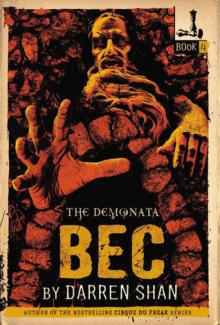 Slawter
Slawter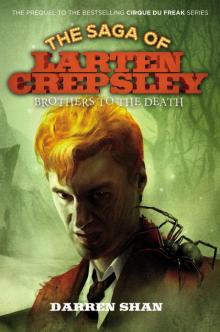 Brothers to the Death
Brothers to the Death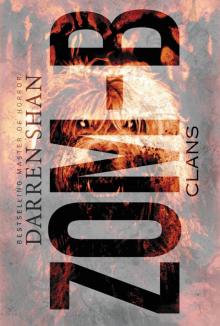 Zom-B Clans
Zom-B Clans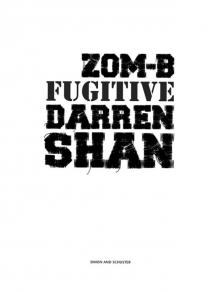 Zom-B Fugitive
Zom-B Fugitive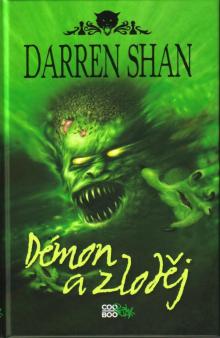 Demon Thief
Demon Thief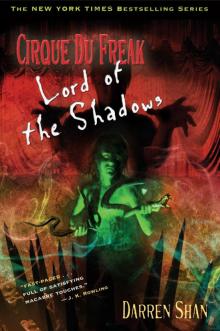 Lord of the Shadows
Lord of the Shadows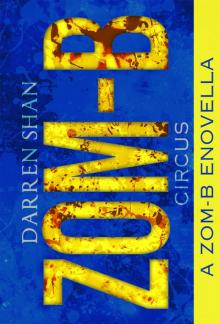 Zom-B Circus
Zom-B Circus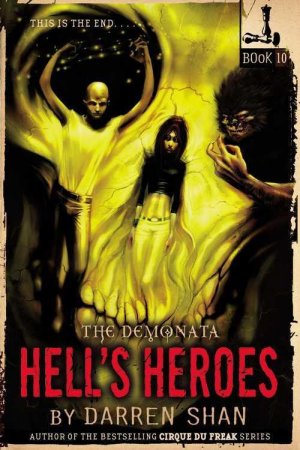 Hell's Heroes
Hell's Heroes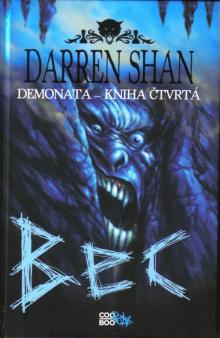 Bec
Bec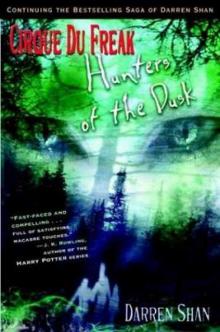 Hunters of the Dusk
Hunters of the Dusk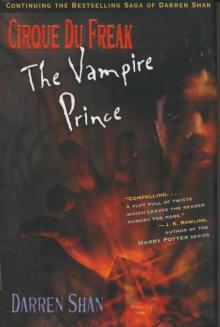 The Vampire Prince
The Vampire Prince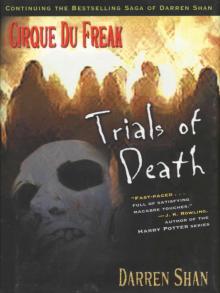 Trials of Death
Trials of Death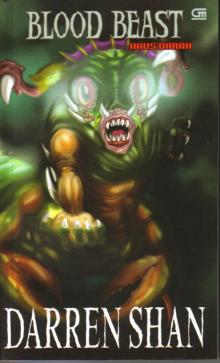 Blood Beast
Blood Beast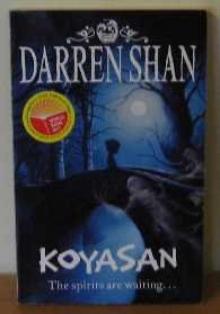 Koyasan
Koyasan Zom-B Goddess
Zom-B Goddess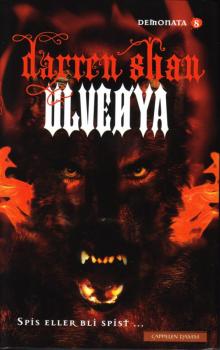 Wolf Island
Wolf Island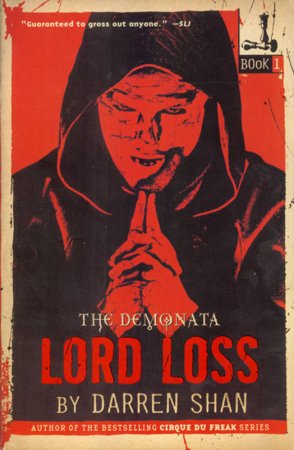 Lord Loss
Lord Loss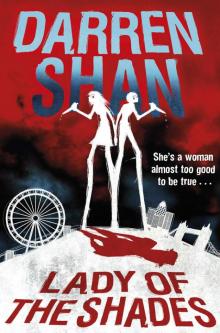 Lady of the Shades
Lady of the Shades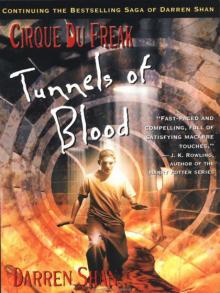 Tunnels of Blood
Tunnels of Blood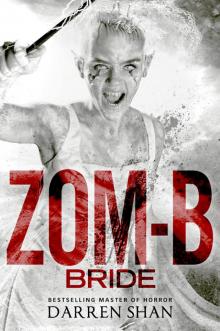 Zom-B Bride
Zom-B Bride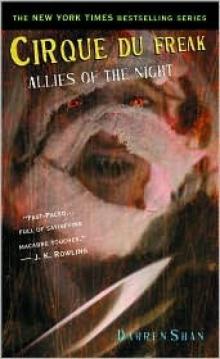 Allies of the Night
Allies of the Night Zom-B Baby
Zom-B Baby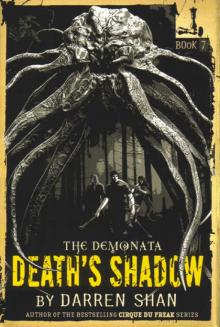 Deaths Shadow
Deaths Shadow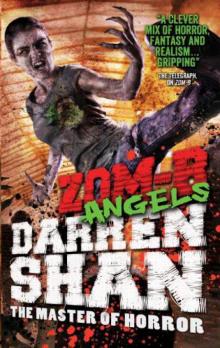 Zom-B Angels
Zom-B Angels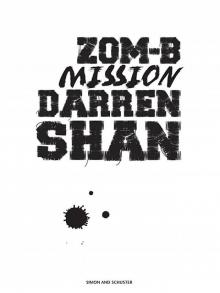 Zom-B Mission
Zom-B Mission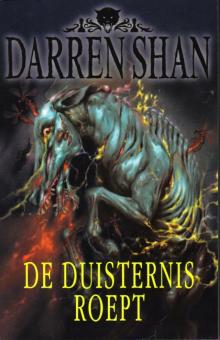 Dark Calling
Dark Calling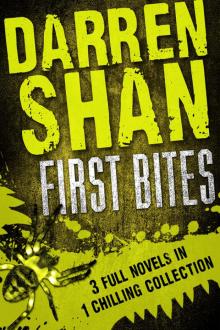 First Bites
First Bites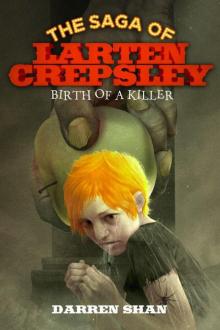 Birth of a Killer
Birth of a Killer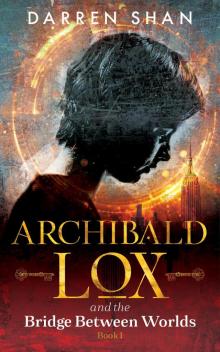 Archibald Lox and the Bridge Between Worlds
Archibald Lox and the Bridge Between Worlds Archibald Lox and the Vote of Alignment
Archibald Lox and the Vote of Alignment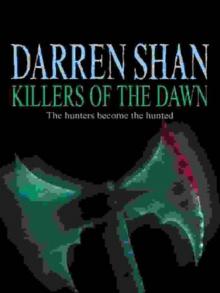 Killers of the Dawn
Killers of the Dawn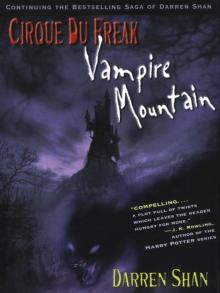 Vampire Mountain
Vampire Mountain Zom-B Gladiator
Zom-B Gladiator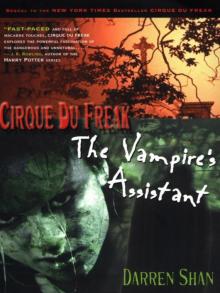 The Vampire's Assistant
The Vampire's Assistant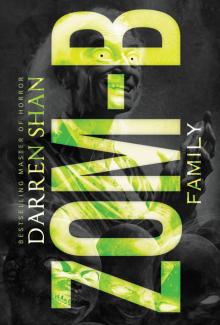 Zom-B Family
Zom-B Family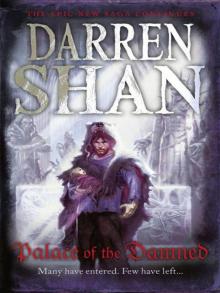 Palace of the Damned
Palace of the Damned A Living Nightmare
A Living Nightmare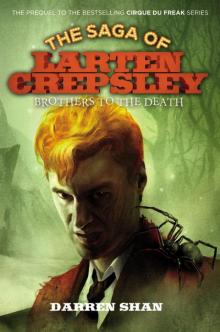 Brothers to the Death (The Saga of Larten Crepsley)
Brothers to the Death (The Saga of Larten Crepsley)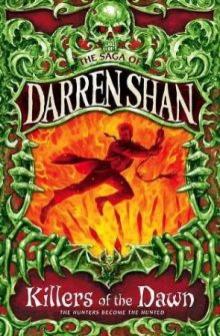 Killers Of The Dawn tsods-9
Killers Of The Dawn tsods-9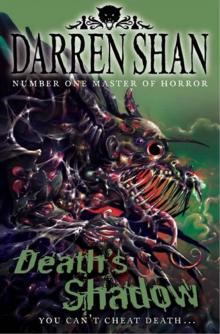 Death's Shadow td-7
Death's Shadow td-7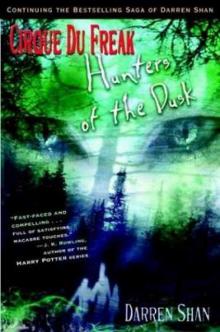 CIRQUE DU FREAK 7 - Hunters of the Dusk
CIRQUE DU FREAK 7 - Hunters of the Dusk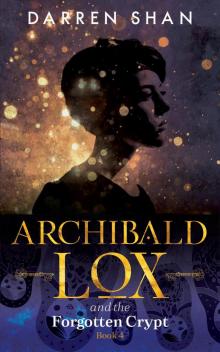 Archibald Lox and the Forgotten Crypt
Archibald Lox and the Forgotten Crypt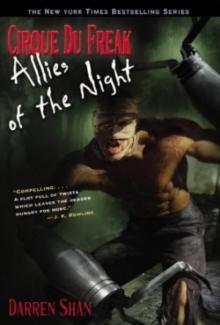 Allies Of The Night tsods-8
Allies Of The Night tsods-8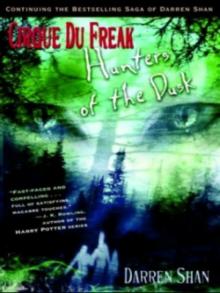 Hunters Of The Dusk tsods-7
Hunters Of The Dusk tsods-7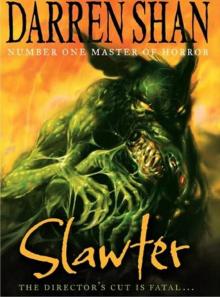 Slawter td-3
Slawter td-3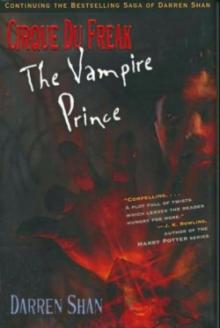 Vampire Prince tsods-6
Vampire Prince tsods-6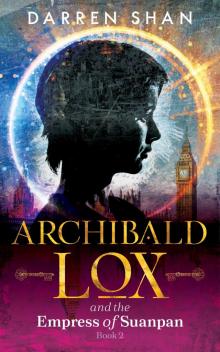 Archibald Lox and the Empress of Suanpan
Archibald Lox and the Empress of Suanpan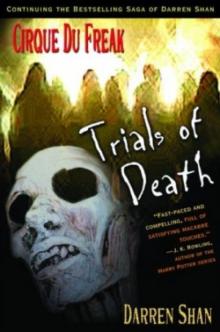 Trials Of Death tsods-5
Trials Of Death tsods-5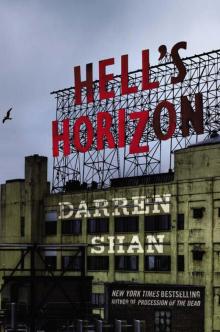 Hell's Horizon tct-2
Hell's Horizon tct-2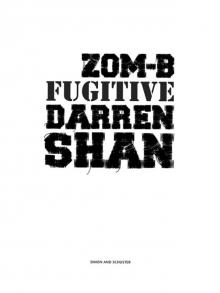 ZOM-B 11
ZOM-B 11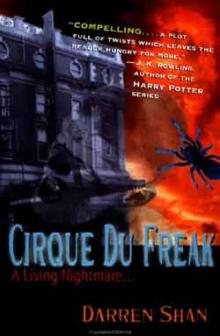 Cirque Du Freak - Book 1
Cirque Du Freak - Book 1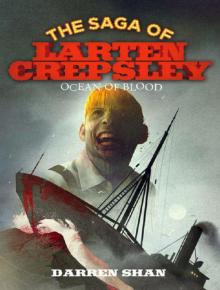 02 Ocean of Blood tsolc-2
02 Ocean of Blood tsolc-2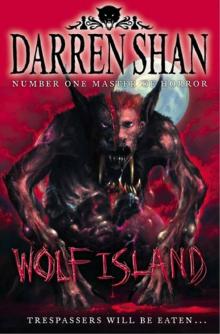 Wolf Island td-8
Wolf Island td-8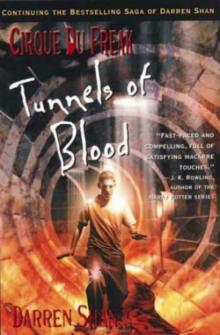 Tunnels of Blood tsods-3
Tunnels of Blood tsods-3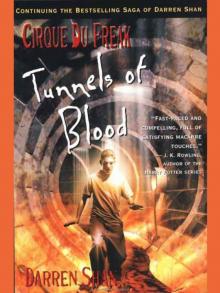 Cirque du Freak 3 - Tunnels of Blood
Cirque du Freak 3 - Tunnels of Blood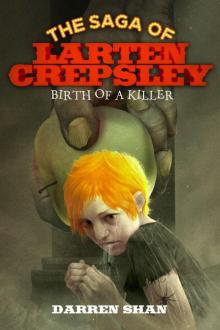 01 Birth of a Killer
01 Birth of a Killer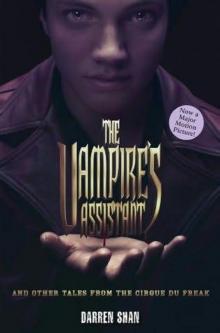 The Vampire's Assistant and Other Tales from the Cirque Du Freak
The Vampire's Assistant and Other Tales from the Cirque Du Freak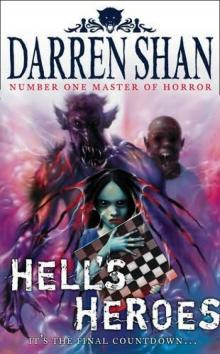 Hell's Heroes td-10
Hell's Heroes td-10 Zom-B #12
Zom-B #12![[Cirque du Freak 11] - Lord of the Shadows Read online](http://i1.bookreadfree.com/i1/03/31/cirque_du_freak_11_-_lord_of_the_shadows_preview.jpg) [Cirque du Freak 11] - Lord of the Shadows
[Cirque du Freak 11] - Lord of the Shadows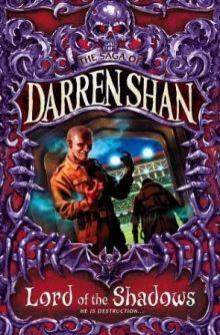 Lord Of The Shadows tsods-10
Lord Of The Shadows tsods-10 Demon Apocalypse td-6
Demon Apocalypse td-6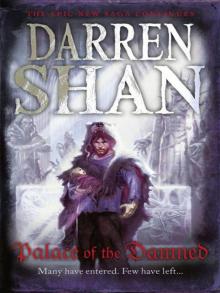 The Saga of Larten Crepsley (3) – Palace of the Damned
The Saga of Larten Crepsley (3) – Palace of the Damned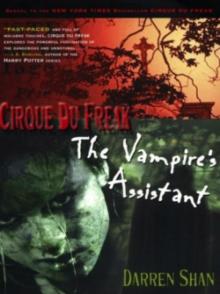 The Vampire's Assistant tsods-2
The Vampire's Assistant tsods-2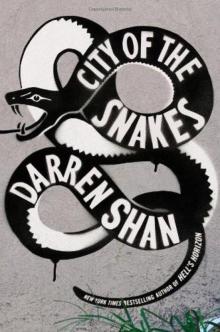 City of the Snakes tct-3
City of the Snakes tct-3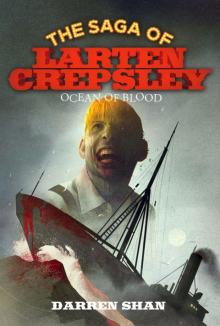 02 Ocean of Blood
02 Ocean of Blood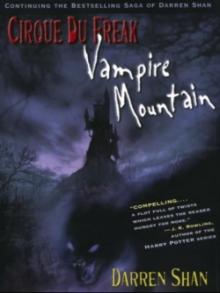 Vampire Mountain tsods-4
Vampire Mountain tsods-4 The Lake Of Souls tsods-11
The Lake Of Souls tsods-11 Lord Loss td-1
Lord Loss td-1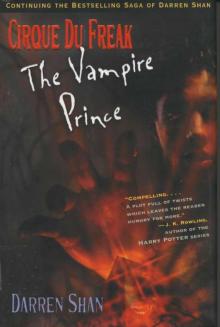 Cirque Du Freak Book 6 - Vampire Prince
Cirque Du Freak Book 6 - Vampire Prince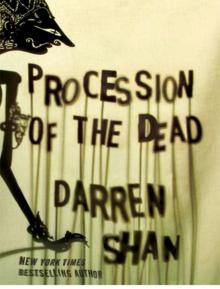 Procession of the dead tct-2
Procession of the dead tct-2 Vampire Prince
Vampire Prince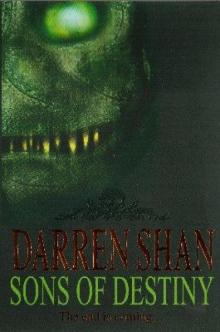 Sons Of Destiny tsods-12
Sons Of Destiny tsods-12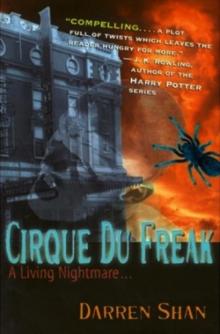 Cirque Du Freak tsods-1
Cirque Du Freak tsods-1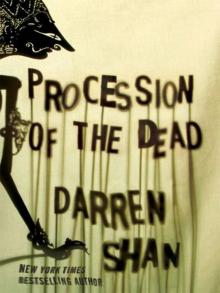 Procession of the Dead
Procession of the Dead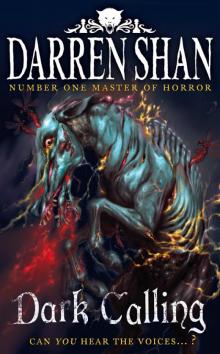 Dark Calling td-9
Dark Calling td-9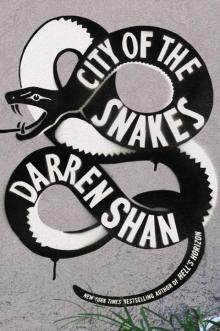 03 City of the Snakes
03 City of the Snakes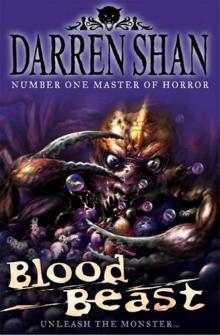 Blood Beast td-5
Blood Beast td-5 Demon Thief td-2
Demon Thief td-2